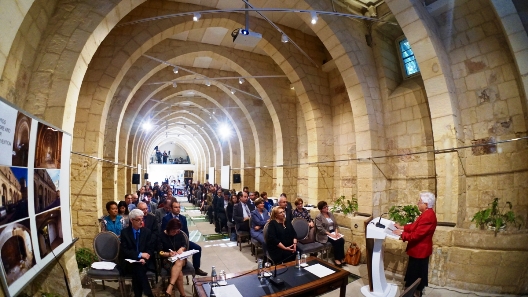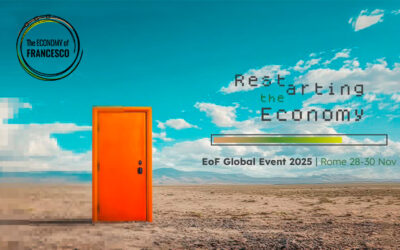 “In today’s globalised and interdependent world, dialogue seems to be the only way that humankind can survive. Either we fight one another to the point of mutual destruction, or we dialogue. In fact, only openness to others and dialogue create life and bring life, because every action is then founded on having recognised one another as brothers and sisters, as children of God. I feel the Holy Spirit is at work everywhere, pushing our Churches in this direction: to dialogue so as to re-establish the unity broken over the centuries, so that Christians can give a shared witness to the world according to Jesus’ prayer: “Father, that they may all be one, so that the world may believe” (Cf Jn 17:21-22)” This was Focolare president, Maria Voce’s, strong encouragement in her presentation. She began from her own personal ecumenical testimony up until her encounter with the spirituality of unity; “In the 1960’s, through the experience of Chiara Lubich, who had come into contact with members of the Brotherhood of the Common Life Germany, dialogue was opened to the Movement. The ecumenical community of Ottmaring was established in Germany, where Catholics and Evangelical Lutherans live together.” During the Second Vatican Council, Chiara entered into contact with several Observers from other Churches. This gave rise to the so-called “Ecumenical Weeks” in which Christians from different Churches gathered yearly to share their experiences of living the Word with particular emphasis on Jesus’s New Commandment: “This is my command: Love one another as I have loved you’” (Jn 13:34). At the historic encounter between the Ecumenical Patriarch Athenagoras I and Chiara Lubich, on June 13, 1967, Maria Voce was head of the local Focolare community in Istanbul. “It was the first of 25 meetings that Chiara would have with that charismatic figure. Athenagoras announced that he was “her disciple” and wanted a focolare to be established in Constantinople.” Other important ecumenical meetings would follow. “Christians from the most varied Churches have wished to share the spirituality of unity and many have embraced specific vocations of the Movement. In fact, Maria Voce recalled, “you don’t dialogue with cultures, but with people. Or rather, we live in dialogue.” She continues: “God is the foundation of dialogue, God who is Love and the Father of all of us and makes us is sons and daughters in the Son, all brothers and sisters in one big family. Right from the start, Chiara took Jesus’s prayer that all be one – which we can translate as ‘making humankind into one family – as her motto in life. She invited millions of people from around the world to live it and make it happen.” So, for the Focolare, “dialogue is a lifestyle, a new culture that the Movement can and wants to offer to all the people of today.” And it has to be “sustained and substantiated by mercy, compassion and love.” Maria Voce cited Chiara Lubich who writes in 1970: “If we don’t have love and charity, we’ll never have the light of God and dialogue. Generic dialogue can become sterile, unfruitful…”[i]. Chiara Lubich continues: “The [person] near me has been created as a gift given to me. On this earth everything is in loving relationship with everything…every thing with every thing. But you need to be Love in order to discover the golden thread among beings” [ii]. Then the Focolare president described the so-called Art of Loving, which is summarized in a few points: love everyone; love always; be the first to love; and make yourself one with your neighbor (see 1 Cor 9:22). (Part 1) [i] C. LUBICH, Discorso ai focolarini,1970. Testo non pubblicato cit. in Vera Araújo, Il quinto dialogo del Movimento dei Focolari. Cosa è, cosa vuole, cosa fa, 7 [ii] C. LUBICH, Scritti Spirituali 1, “L’attrattiva del tempo moderno”, Città Nuova, Rome 1978, 140.
“In today’s globalised and interdependent world, dialogue seems to be the only way that humankind can survive. Either we fight one another to the point of mutual destruction, or we dialogue. In fact, only openness to others and dialogue create life and bring life, because every action is then founded on having recognised one another as brothers and sisters, as children of God. I feel the Holy Spirit is at work everywhere, pushing our Churches in this direction: to dialogue so as to re-establish the unity broken over the centuries, so that Christians can give a shared witness to the world according to Jesus’ prayer: “Father, that they may all be one, so that the world may believe” (Cf Jn 17:21-22)” This was Focolare president, Maria Voce’s, strong encouragement in her presentation. She began from her own personal ecumenical testimony up until her encounter with the spirituality of unity; “In the 1960’s, through the experience of Chiara Lubich, who had come into contact with members of the Brotherhood of the Common Life Germany, dialogue was opened to the Movement. The ecumenical community of Ottmaring was established in Germany, where Catholics and Evangelical Lutherans live together.” During the Second Vatican Council, Chiara entered into contact with several Observers from other Churches. This gave rise to the so-called “Ecumenical Weeks” in which Christians from different Churches gathered yearly to share their experiences of living the Word with particular emphasis on Jesus’s New Commandment: “This is my command: Love one another as I have loved you’” (Jn 13:34). At the historic encounter between the Ecumenical Patriarch Athenagoras I and Chiara Lubich, on June 13, 1967, Maria Voce was head of the local Focolare community in Istanbul. “It was the first of 25 meetings that Chiara would have with that charismatic figure. Athenagoras announced that he was “her disciple” and wanted a focolare to be established in Constantinople.” Other important ecumenical meetings would follow. “Christians from the most varied Churches have wished to share the spirituality of unity and many have embraced specific vocations of the Movement. In fact, Maria Voce recalled, “you don’t dialogue with cultures, but with people. Or rather, we live in dialogue.” She continues: “God is the foundation of dialogue, God who is Love and the Father of all of us and makes us is sons and daughters in the Son, all brothers and sisters in one big family. Right from the start, Chiara took Jesus’s prayer that all be one – which we can translate as ‘making humankind into one family – as her motto in life. She invited millions of people from around the world to live it and make it happen.” So, for the Focolare, “dialogue is a lifestyle, a new culture that the Movement can and wants to offer to all the people of today.” And it has to be “sustained and substantiated by mercy, compassion and love.” Maria Voce cited Chiara Lubich who writes in 1970: “If we don’t have love and charity, we’ll never have the light of God and dialogue. Generic dialogue can become sterile, unfruitful…”[i]. Chiara Lubich continues: “The [person] near me has been created as a gift given to me. On this earth everything is in loving relationship with everything…every thing with every thing. But you need to be Love in order to discover the golden thread among beings” [ii]. Then the Focolare president described the so-called Art of Loving, which is summarized in a few points: love everyone; love always; be the first to love; and make yourself one with your neighbor (see 1 Cor 9:22). (Part 1) [i] C. LUBICH, Discorso ai focolarini,1970. Testo non pubblicato cit. in Vera Araújo, Il quinto dialogo del Movimento dei Focolari. Cosa è, cosa vuole, cosa fa, 7 [ii] C. LUBICH, Scritti Spirituali 1, “L’attrattiva del tempo moderno”, Città Nuova, Rome 1978, 140.
Be disarmed
Be disarmed




0 Comments